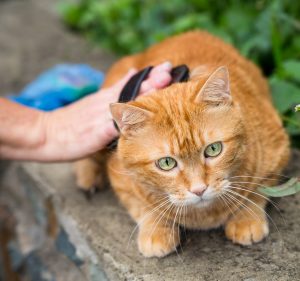Is My Cat Normal? —The Truth About Hairballs
 Hairballs are an unfortunate part of life for most cat owners. That low, hacking sound you can hear from anywhere in the house is the telltale sign that kitty is about to deposit hairballs in the least convenient place possible.
Hairballs are an unfortunate part of life for most cat owners. That low, hacking sound you can hear from anywhere in the house is the telltale sign that kitty is about to deposit hairballs in the least convenient place possible.
While it’s easy to assume that coughing or vomiting in cats is caused by a hairball, this isn’t always the case. Frequent coughing or vomiting in cats is not normal, and may indicate an underlying health problem.
Hairballs 101
Hairballs are the result of undigested hair left over from our cats’ fastidious grooming habits. Hairballs (also known by their scientific name “trichobezoars”) are not actually ball shaped; rather they are cylindrical, taking the shape of the cat’s esophagus as they are regurgitated. No cat is immune to hairballs, but longhaired varieties are certainly more prone.
You can help your cat to cut down on the occurrence of hairballs in a variety of ways:
- Daily brushing, and occasional trips to the groomer for long-haired cats
- Specially formulated cat foods are available that can reduce shedding and encourage hairballs to pass naturally through the digestive system. Contact us for recommendations
- Consider using a hairball remedy. Most products available are mild, petroleum based laxatives that are effective at minimizing hairballs and helping them to pass easily.
Other Reasons For Regurgitation Or Coughing
Most cats will produce a hairball about every other week or so. If your cat is coughing or vomiting more often than that, it may indicate a more serious health problem, such as:
- Intestinal blockage
- Upper respiratory tract infection
- Allergies
- Asthma
Please give us a call if your cat is coughing or vomiting regularly, or exhibiting any of the following symptoms:
- Changes in appetite or thirst
- Lethargy
- Blood in stool
- Constipation
- Diarrhea
A Word About Grass
Even if you don’t allow your cat outside, you may already have witnessed him or her munching on grass or other greenery. You may have also witnessed him or her throwing up said green material shortly afterward. This is a normal cat activity that may help him or her to pass hairballs more easily by providing fiber to the digestive tract.
Since most houseplants are toxic to cats, it’s a good idea to provide your indoor kitty with his or her own supply of cat grass. Cat grass is simple to grow in a small pot indoors, or can be purchased pre-grown at most lawn and garden supply stores.
If you have any questions or concerns about hairballs, please don’t hesitate to give us a call!

